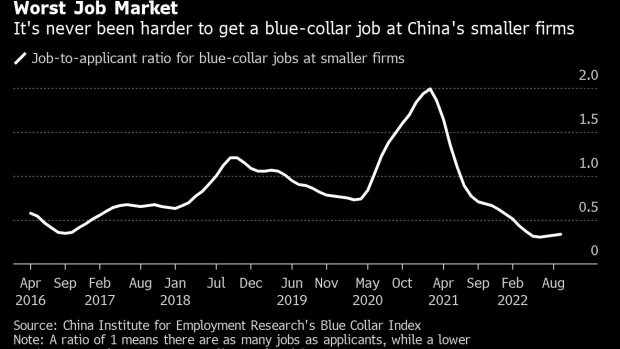Oct 27, 2022
Hiring at China’s Small Firms Fails to Pick Up from Record Low
, Bloomberg News

(Bloomberg) -- Hiring activities by China’s smaller companies were near a record low last month, underscoring how the slump due to a property downturn and Covid Zero controls is hitting firms which are the backbone of the economy.
The ‘Blue Collar’ Job Index for small and medium-sized businesses, which are mostly in manufacturing and services, showed little improvement in the third quarter after hitting an all-time low of 0.3 in June, according to the Beijing-based China Institute for Employment Research. That means there’s more than three times as many applicants as there are jobs available.
The index “reflects declining hiring demand in manufacturing and services due to the economic downturn” said Zeng Xiangquan, head of the institute which compiled the data. The recent plunge is a sharp reversal from the situation in late 2020 and early 2021, when the index climbed as factories struggled to hire enough workers to meet surging overseas orders for Chinese goods during the pandemic.
The index is compiled based on data from job listing website 58.com Inc. that begins in 2016.
Nationwide data showed the employment situation worsened in September, with the surveyed jobless rate rising to 5.5%, while the youth unemployment rate was almost 18%, according to data released earlier this week.
Covid and Housing
On top of dwindling demand from factories, Covid restrictions also damaged businesses in tourism, catering and hospitality, according to Zeng. Small companies are likely to be less resilient than larger ones when it comes to withstanding shocks, he said.
With the housing slump now lasting more than a year, jobs related to the property and construction industries showed the biggest declines in the third quarter compared to last year. Job postings for construction supervisors tumbled 94% from a year ago, while postings for general construction workers, heating and air-conditioning mechanics and forklift operators all plunged more than 80%, according to the index.
That’s a change from the second quarter, when major cities like Shanghai and Shenzhen went into lockdowns and positions such as subway and bus workers, shop assistants and coffee baristas saw the biggest falls.
©2022 Bloomberg L.P.


